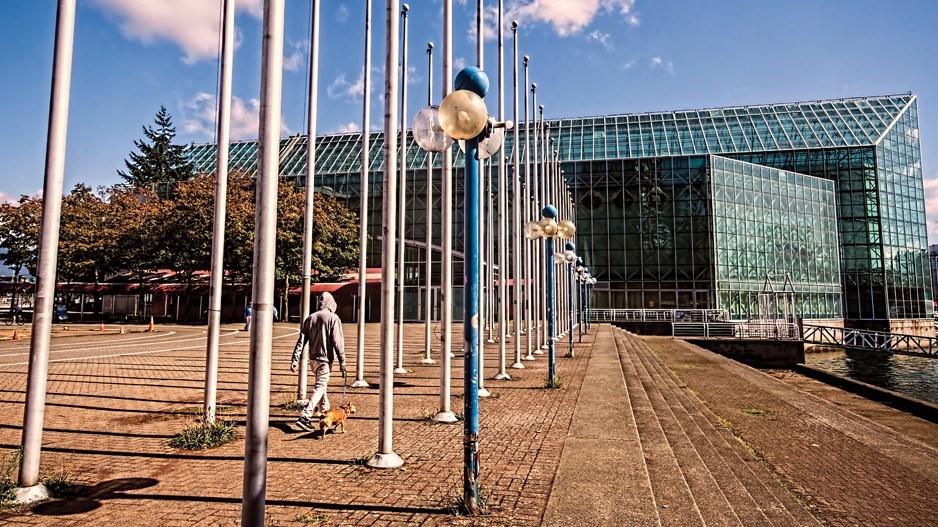The legal battle over the Expo lands continued this month, when developer Concord Pacific Group appealed a court decision that awarded “special costs” in the $5 million range to a Singaporean billionaire.
Counsel for both sides appeared in front of BC Court of Appeal judges David C. Harris, Sunni Stromberg-Stein and Gail M. Dickson on September 13 and 14, with the Vancouver-based developer appealing a BC Supreme Court decision in January in favour of Oei Hong Leong, who bought the property – formerly known as the Plaza of Nations – from Concord and Hong Kong magnate Li Ka-Shing in 1989.
The conflict stems from a 2015 “Heads of Agreement” signed in Hong Kong between Oei and current Concord president and CEO Terry Hui, in which the two sides agreed on the sale and development of the Expo lands. The deal for the property, valued by Oei at $500 million at the time, has since fallen apart, and both Oei and Concord have sued the other party over a variety of grievances.
In 2019, the court sided with Oei in rejecting Concord’s lawsuit against Oei for breach of contract, an allegation based on Concord’s position that the Heads of Agreement was an enforceable, legally binding contract.
In BC Supreme Court Justice Peter Voith’s January 29 decision, the court ordered Concord to pay 80% of special costs demanded by Oei.
In its latest appeal, Concord’s main grievance was outlined in March 29 court documents. Concord challenged both the 2019 and the January decisions, maintaining that the agreement was enforceable, and claimed the judge “misapplied the law on essential terms” and “failed to apply the duty to negotiate outstanding matters in good faith in the context of an existing agreement.”
Concord also challenged the court’s decision to award Oei 80% of the legal costs he was seeking, saying that if Concord succeeds in its appeal of the original 2019 decision, then it “is generally entitled to its costs throughout the proceedings at both the trial and appeal level.”
The main point of contention in the appeal, as it was in the main trial, remains the Heads of Agreement. In 2019 and in January, the judge noted that both Oei and Hui intended the “Heads” to be a binding contract at the time of its signing in 2015. However, the court added that the agreement lacked several elements that are considered essential to a contract, and without them, it was not possible to enforce the agreement as such.
In his January decision, Voith also said the that the testimony of David Ju – a vice-president with Concord who was central in negotiating the deal between Hui and Oei – in the civil trial was problematic enough to satisfy the conditions under which the court would award “special costs.”
“There is a significant distinction between, on the one hand, evidence that is given by a witness and is merely rejected by the court and, on the other hand, evidence that is intended or designed to mislead or is otherwise put forth for an improper purpose,” Voith said in the January decision. “Only the latter form of conduct warrants the court’s rebuke ….
“On dozens of occasions during the course of his evidence and, in particular, his cross-examination, Mr. Ju testified that he had no memory of any of the circumstances of an event, or meeting, or conversation,” the decision continued. “He did not recall, even in general terms, what had been said…. Notwithstanding this lack of memory, he often purported, however, to recall some agreement or concession that he said [Oei representative Chu Yow-Lin] had made with him or to him.
“The specific recollections almost always sought to advance one of Concord’s various positions,” the court decision concluded.
Voith was also critical of some of Oei's actions in the case. The judge noted the Singaporean magnate was likely "hedging his bets," entertaining another offer from the Aquilini Group for the sale and development of the Plaza of Nations while being "reluctant to walk away from the Heads outright."
That Oei was entertaining the Aquilini Group for a deal after the Heads of Agreement was reached, Voith said, could have been problematic.
"He [Oei] sought to first ascertain whether a comparable or better transaction with the Aquilini Group was viable," Voith said in his 2019 judgement. "If there was an agreement between Concord and the Defendants [Oei] it was wrong, and it would have been a breach of an implied term to act with reasonable dispatch, for Mr. Oei to suspend his negotiations with Concord while he pursued an alternate strategy. He should have confronted Concord... at an earlier time."
Concord, in its appeal, remained focused on the fundamentals of the case: that there was a breach of contract that took place.
“While the Heads did not – and could not – settle all aspects of the redevelopment, that did not mean they were a legal nothing,” Concord lawyers argued in its factum. “The law is more pragmatic than that….
“The trial judge’s approach runs afoul of the commercially sound approach to enforceability that this Court has consistently endorsed for decades – one that fosters commercial certainty and upholds, rather than thwarts, the reasonable expectations of sophisticated and experienced businesspeople,” Concord’s argument concluded.
The Court of Appeal has not indicated when it will release its decision in the case. •




